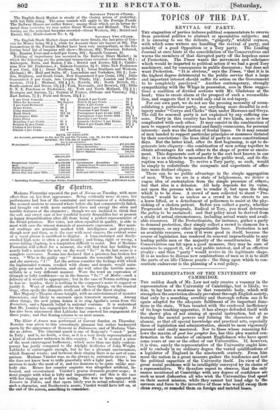TOPICS OF THE DAY.
REVIVAL OF PARTY.
TIM stagnation of parties induces political commentators to swerve from practical politics to abstract or speculative subjects; and it is amusing to see the delicate, "gingerly," wishful coyness, with which some writers are handling the revival of party, and notably, of a good Opposition or a Tory party. The Leading Tournal at once hints at the consolidation of the Conservatives and warns the members of that disrupted party off the hopeless cause of Protection. The Times wants the movement and substance which would be imparted to political action if we had a good Tory machinery, and by consequence to public discussion; but does not want Protection. "It is obvious," says the Times, "that it is in the highest degree detrimental to the public service that a large and important interest should suffer its action on the Government to be completely paralyzed." Another contemporary, strongly sympathizing with the Whigs in possession, sees in these sugges- tions a coalition of divided sections with Mr. Gladstone at the head ; tries to create alarm at the prospect of such a reconsolida- tion, and suggests that it would only end in red-tapery.
For our own part, we do not see the pressing necessity of recon- solidating a particular party, nor anything more dreadful in red- tapery under " Corrys and Clerks" than under Haweses and Greys. The call for renewed party is not explained by any sufficing rea- sons. Party in. this country has been of two kinds, more or less complicated with each other. It may consist in the combination of men to support certain personal and family connexions, for personal interests : such was the faction of feudal times. Or it may consist of men banded to support particular principles or measures dictated. by their convictions : the beau ideal of party in more constitutional days. But the latter kind, after its first beginning, is apt to de- generate into cliquery—the combination of men acting together to obtain advantages for each other in the shape of power or emolu- ment. This degenerate sort of party is the sort best known in our day: it is an obstacle to measures for the public weal, and its dis- ruption was a blessing. To revive a Tory party, as such, would be simply to redistribute the occupants and expectants of office into more distinct cliques.
There can be no public advantage in the simple aggregation of men. When we are in a state of helplessness, we derive a vague idea of sustentation from the simple presence of others; but that idea is a delusion. All help depends for its value, not upon the persons who are to render it, but upon the thing which is to be done. A crowd of men collected to shout " Pro- tection " would be as useless as a crowd in the streets to see a horse lifted, or a detachment of policemen to assist at the phy- sicking of a cholera patient. Before you collect a party, whether Progressist or Retrograde, Radical or Tory, you must determine the policy to be sustained; and that policy must be derived from a study of actual circumstances mein mg actual wants and avail- able resources. If the Protectionists, for instance, gather a party to demand protection, they simply collect a crowd to clamour for a fine summer, or any other impracticable boon. Proteetaon is not an available resource, even if it were good in itself, because the course of legislation has rendered its renewal impracticable to any leading public men or the majority of the constituencies. If the Conservatives can hit upon a good measure, they may be sure of numbers to support it, of a real public interest, and of an efetive rivalry ; and then "party"would revive in its legitimate shape- It is as useless to discuss new combinations of men as it is to shift the parts of an idle Chinese puzzle • the thing upon which to con- centrate endeavour is the planning of a real policy.


























 Previous page
Previous page